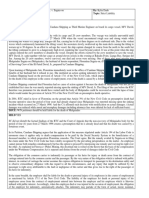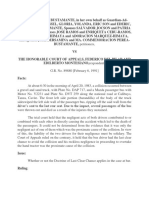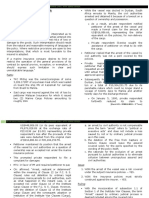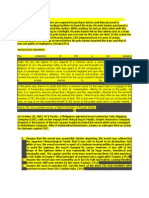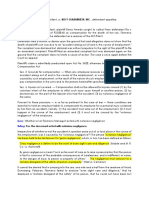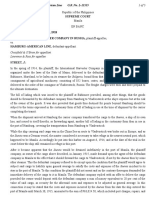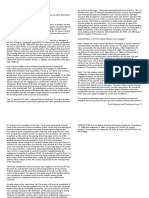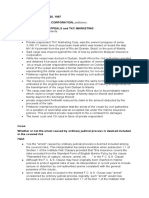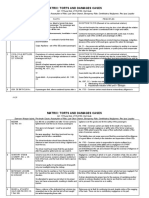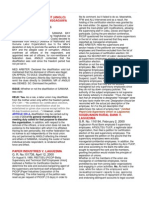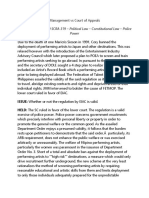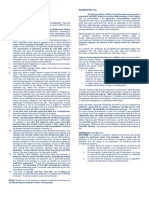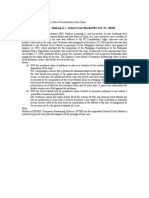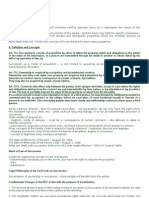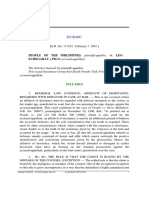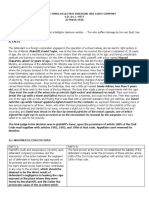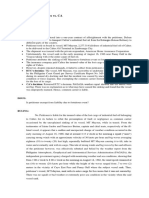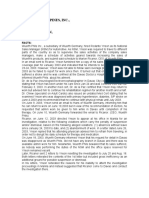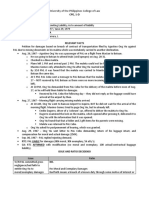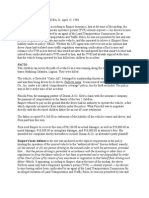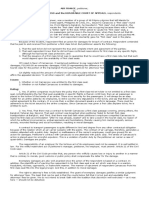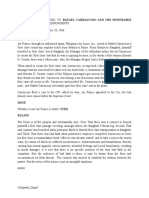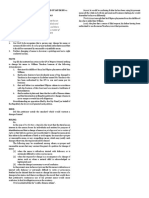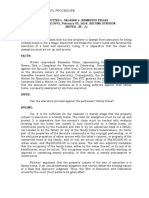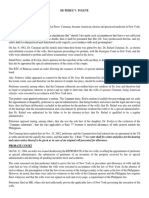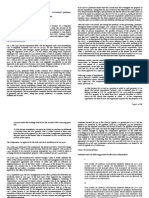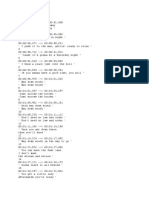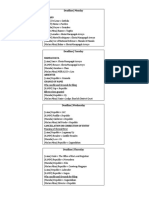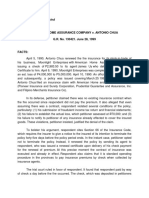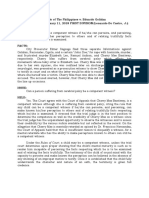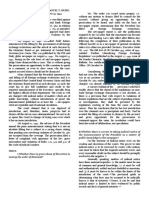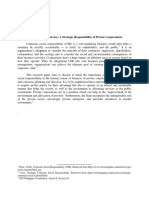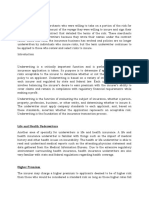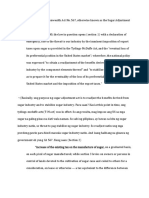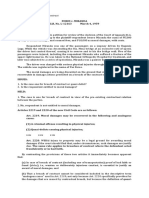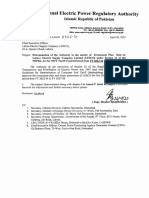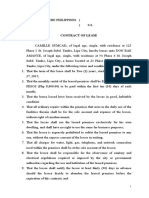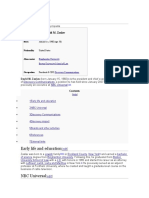19.air France V Carrasoco
19.air France V Carrasoco
Uploaded by
Angela Louise SabaoanCopyright:
Available Formats
19.air France V Carrasoco
19.air France V Carrasoco
Uploaded by
Angela Louise SabaoanOriginal Description:
Original Title
Copyright
Available Formats
Share this document
Did you find this document useful?
Is this content inappropriate?
Copyright:
Available Formats
19.air France V Carrasoco
19.air France V Carrasoco
Uploaded by
Angela Louise SabaoanCopyright:
Available Formats
AIR FRANCE vs.
RAFAEL CARRASCOSO
G.R. No. L-21438 September 28, 1966
FACTS:
Rafael Carrasoco is a civil engineer and was a member of a group of 48 Filipino
pilgrims that left Manila for Lourdes on March 30, 1958. On March 28, 1958 Air France,
through its authorized agent, Philippine Air Lines, Inc., issued to plaintiff a "first class"
round trip airplane ticket from Manila to Rome. From Manila to Bangkok, plaintiff travelled
in "first class", however at Bangkok, the Manager of the defendant airline forced plaintiff to
vacate the "first class" seat that he was occupying because, in the words of the witness
Ernesto G. Cuento, there was a "white man", who, the Manager alleged, had a "better right"
to the seat. When asked to vacate his "first class" seat Mr. Carrasoco refused, and told
defendant's Manager that his seat would be taken over his dead body, when some of the
passengers at the tourist class found out that Mr. Carrascoso was having a hot discussion
with Manager, they came all across to Mr. Carrascoso and pacified Mr. Carrascoso to give his
seat to the white man" and Mr. Carrascoso unwillingly gave his "first class" seat in the plane.
ISSUE:
1) Is there a breach of contract by Air France?
2) Is Rafael Carrasoco entitled to damages?
RULING:
1) Petitioner's trenchant claim is that Carrascoso's action is planted upon breach of
contract – that to authorize an award for moral damages there must be an averment of
fraud or bad faith and that the decision of the Court of Appeals fails to make a finding of bad
faith. The allegations in the complaint are: (a) Mr. Carrascoso entered into a contract of air
carriage with the Philippine Air Lines for a valuable consideration, (b) that, during the first
two legs of the trip from Hongkong to Saigon and from Saigon to Bangkok, defendant
furnished to the plaintiff First Class accommodation but only after protestations, arguments
and/or insistence were made by the plaintiff with defendant's employees and (c) Air France
failed to provide First Class passage, but instead furnished plaintiff only Tourist Class
accommodations from Bangkok to Teheran and/or Casablanca and that the plaintiff has
been compelled by defendant's employees to leave the First Class accommodation berths at
Bangkok after he was already seated.
As a result of defendant's failure to furnish First Class accommodations, Mr.
Carrascoso suffered inconveniences, embarrassments, and humiliations, thereby causing
plaintiff mental anguish, serious anxiety, wounded feelings, social humiliation, and the like
injury, resulting in moral damages in the amount of P30,000.00.
The Court’s opinion are as follows: First, That there was a contract to furnish
plaintiff a first class passage covering, amongst others, the Bangkok-Teheran leg; Second,
That said contract was breached when petitioner failed to furnish first class transportation
at Bangkok; and Third, that there was bad faith when petitioner's employee compelled
Carrascoso to leave his first class accommodation berth "after he was already, seated" and to
take a seat in the tourist class, by reason of which he suffered inconvenience,
embarrassments and humiliations, thereby causing him mental anguish, serious anxiety,
wounded feelings and social humiliation, resulting in moral damages. It is true that there is
no specific mention of the term bad faith in the complaint. But, the inference of bad faith is
there, it may be drawn from the facts and circumstances set forth therein. The contract was
averred to establish the relation between the parties. But the stress of the action is put on
wrongful expulsion.
On the question of bad faith, the Court of Appeals declared that the plaintiff was
forced out of his seat in the first class compartment of the plane belonging to the defendant
Air France while at Bangkok, and was transferred to the tourist class not only without his
consent but against his will, has been sufficiently established by Mr. Carrascoso’s testimony
before the court, corroborated by the corresponding entry made by the purser of the plane
in his notebook which notation reads as follows: "First-class passenger was forced to go to
the tourist class against his will, and that the captain refused to intervene",
2) Yes, Mr. Carrascoso is entitled to damages. For the willful malevolent act of
petitioner's manager, petitioner, his employer, must answer. Article 21 of the Civil Code
says: “Any person who willfully causes loss or injury to another in a manner that is contrary
to morals, good customs or public policy shall compensate the latter for the damage.”
The contract of air carriage generates a relation attended with a public duty. Neglect
or malfeasance of the carrier's employees, naturally, could give ground for an action for
damages. They have a right to be treated by the carrier's employees with kindness, respect,
courtesy and due consideration. They are entitled to be protected against personal
misconduct, injurious language, indignities and abuses from such employees. So it is, that
any rule or discourteous conduct on the part of employees towards a passenger gives the
latter an action for damages against the carrier.
Petitioner's contract with Carrascoso is one attended with public duty. The stress of
Carrascoso's action as we have said, is placed upon his wrongful expulsion. This is a
violation of public duty by the petitioner air carrier — a case of quasi-delict. Damages are
proper.
Exemplary damages are as well awarded. The Civil Code gives the court ample
power to grant exemplary damages — in contracts and quasi- contracts. The only condition
is that defendant should have "acted in a wanton, fraudulent, reckless, oppressive, or
malevolent manner." The manner of ejectment of respondent Carrascoso from his first
class seat fits into this legal precept. And this is in addition to moral damages.
You might also like
- Cyber Safety PP Presentation For Class 11Document16 pagesCyber Safety PP Presentation For Class 11WAZ CHANNEL100% (1)
- Wallace - Presentation S&OP PDFDocument91 pagesWallace - Presentation S&OP PDFatolosaNo ratings yet
- Chuttillu From Visakhapatnam Vernacular SettlementsDocument22 pagesChuttillu From Visakhapatnam Vernacular SettlementsSAURABH KUMAR SINGH100% (3)
- Manila Steamship Co v. InsaDocument2 pagesManila Steamship Co v. InsaJogie AradaNo ratings yet
- Case Name: Candano Shipping Lines, Inc. v. Sugata-On GR No. GR No. 163212 Date: March 13, 2007 By: Kylie Dado Topic: Strict LiabilityDocument2 pagesCase Name: Candano Shipping Lines, Inc. v. Sugata-On GR No. GR No. 163212 Date: March 13, 2007 By: Kylie Dado Topic: Strict LiabilityKylie Kaur Manalon Dado100% (1)
- Digest Week 7 - 8Document54 pagesDigest Week 7 - 8Leonor LeonorNo ratings yet
- Emma Adriano Bustamante vs. Ca 2Document2 pagesEmma Adriano Bustamante vs. Ca 2Claire SilvestreNo ratings yet
- Transpo - 2Document60 pagesTranspo - 2YsabelleNo ratings yet
- Philippine Phoenix Surety & Insurance Company v. Woodwork, Inc., G.R. No. L-25317, 06 August 1979, (92 SCRA 419Document2 pagesPhilippine Phoenix Surety & Insurance Company v. Woodwork, Inc., G.R. No. L-25317, 06 August 1979, (92 SCRA 419Roseller SasisNo ratings yet
- Geluz V CADocument1 pageGeluz V CAAnthony Arcilla PulhinNo ratings yet
- St. Francis High School vs. Court of AppealsDocument3 pagesSt. Francis High School vs. Court of AppealsMandaluyong RtcNo ratings yet
- University of The Philippines College of LawDocument3 pagesUniversity of The Philippines College of LawSophiaFrancescaEspinosaNo ratings yet
- Malayan Insurance Vs CADocument3 pagesMalayan Insurance Vs CACindee YuNo ratings yet
- Lopez Vs PanamDocument2 pagesLopez Vs PanamMaria Cecilia OlivaNo ratings yet
- Cebu Shipyard and Engineering Works, Inc. v. William Lines, Inc.Document1 pageCebu Shipyard and Engineering Works, Inc. v. William Lines, Inc.naomi alanoNo ratings yet
- Gelisan V AldayDocument2 pagesGelisan V AldayErika ColladoNo ratings yet
- Transpo NotesDocument4 pagesTranspo NotesJuris GempisNo ratings yet
- Filipino Merchants Insurance Co. Inc. V. CaDocument2 pagesFilipino Merchants Insurance Co. Inc. V. CaJeorge Ryan MangubatNo ratings yet
- 93 - Amedo Vs Rio y OlabarrietaDocument2 pages93 - Amedo Vs Rio y OlabarrietaLawrence EsioNo ratings yet
- 155934-1927-Western Equipment and Supply Co. v. Reyes20180411-1159-Pkkb6kDocument10 pages155934-1927-Western Equipment and Supply Co. v. Reyes20180411-1159-Pkkb6kShairaCamilleGarciaNo ratings yet
- 18-International Harvester Co. v. Hamburg American Line 42 Phil 845Document5 pages18-International Harvester Co. v. Hamburg American Line 42 Phil 845Jopan SJNo ratings yet
- Torts DigestDocument47 pagesTorts DigestNoreen NombsNo ratings yet
- Fist Philippine Industrial Corp. Vs CA, GR 125948, Dec. 29,1998Document6 pagesFist Philippine Industrial Corp. Vs CA, GR 125948, Dec. 29,1998jonathanNo ratings yet
- Malayan Insurance v. Ca GR 119599Document2 pagesMalayan Insurance v. Ca GR 119599Princess FaithNo ratings yet
- Siasat V IACDocument13 pagesSiasat V IACbernadetteNo ratings yet
- Provisional Remedies Cases - Rule 59Document30 pagesProvisional Remedies Cases - Rule 59Ma Gloria Trinidad ArafolNo ratings yet
- Del Prado v. Manila Electric CoDocument2 pagesDel Prado v. Manila Electric CoSean GalvezNo ratings yet
- Matrix: Torts and Damages CasesDocument15 pagesMatrix: Torts and Damages CasesYVONNE PACETENo ratings yet
- Schulze vs. Tullet Prebon PDFDocument25 pagesSchulze vs. Tullet Prebon PDFFatzie MendozaNo ratings yet
- Alliance of NationalistDocument4 pagesAlliance of NationalistKhein AnggacoNo ratings yet
- Pedro Vasquez vs. CADocument2 pagesPedro Vasquez vs. CARhea CalabinesNo ratings yet
- Transpo ReviewerDocument30 pagesTranspo ReviewerJade Ligan EliabNo ratings yet
- Transpo Case DigestDocument5 pagesTranspo Case DigestAlyssa Mae BasalloNo ratings yet
- Bill of Lading I. Concepts, Definition and Kinds Bill of Lading (BOL) The 3-Fold Nature of The Bill of LadingDocument4 pagesBill of Lading I. Concepts, Definition and Kinds Bill of Lading (BOL) The 3-Fold Nature of The Bill of LadingDiane UyNo ratings yet
- G.R. No. 120095 - 260 SCRA 319 - Political Law - Constitutional Law - Police PowerDocument11 pagesG.R. No. 120095 - 260 SCRA 319 - Political Law - Constitutional Law - Police PowerGui EshNo ratings yet
- Milan V. NLRC: Ruling/Ratio: YesDocument6 pagesMilan V. NLRC: Ruling/Ratio: YesnathNo ratings yet
- Prudential Bank Vs RapanotDocument7 pagesPrudential Bank Vs RapanotAndree MorañaNo ratings yet
- Sumbang Jr. v. General Court Martial PRO G.R. No. 140188Document1 pageSumbang Jr. v. General Court Martial PRO G.R. No. 140188JP Murao IIINo ratings yet
- Marvel Building Corporation, Et Al. vs. Saturnino David, in His Capacity As Collector, Bureau of Internal Revenue FactsDocument3 pagesMarvel Building Corporation, Et Al. vs. Saturnino David, in His Capacity As Collector, Bureau of Internal Revenue FactsJORLAND MARVIN BUCUNo ratings yet
- Succession Outline Notes&Cases-FormattedDocument134 pagesSuccession Outline Notes&Cases-FormattedJosephNo ratings yet
- Prince Transport V GarciaDocument3 pagesPrince Transport V GarciaElah ViktoriaNo ratings yet
- Case Digest Del Carmen v. BacoyDocument4 pagesCase Digest Del Carmen v. BacoymagenNo ratings yet
- Actions and Damages - Digest Transpo LawDocument42 pagesActions and Damages - Digest Transpo LawDennis Aran Tupaz AbrilNo ratings yet
- Bachelor Express, Inc V CADocument2 pagesBachelor Express, Inc V CAVox PopuliNo ratings yet
- 3 Coastwise Lighterage Corporation vs. CADocument2 pages3 Coastwise Lighterage Corporation vs. CAmei atienzaNo ratings yet
- 09 Maritime Company vs. CADocument10 pages09 Maritime Company vs. CAKris Dela CruzNo ratings yet
- Stolt Nielsen Vs NLRCDocument3 pagesStolt Nielsen Vs NLRCWonder WomanNo ratings yet
- People of The Philippines Vs Leo EchegarayDocument81 pagesPeople of The Philippines Vs Leo Echegarayrestless11No ratings yet
- 20 Rustan Pulp & Paper Mills, Inc. vs. IAC 214 SCRA 665, October 19, 1992Document9 pages20 Rustan Pulp & Paper Mills, Inc. vs. IAC 214 SCRA 665, October 19, 1992Ann MarinNo ratings yet
- TAYLOR Vs THE MANILA ELECTRIC RAILROAD AND LIGHT COMPANYDocument2 pagesTAYLOR Vs THE MANILA ELECTRIC RAILROAD AND LIGHT COMPANYJohnny EnglishNo ratings yet
- Nikko Hotel Manila Garden and Ruby LimDocument5 pagesNikko Hotel Manila Garden and Ruby LimRenz GuiangNo ratings yet
- Delsan Transport Lines vs. CADocument2 pagesDelsan Transport Lines vs. CAKris HannahNo ratings yet
- TRIGGER WARNING: Graphic Description of DeathDocument5 pagesTRIGGER WARNING: Graphic Description of DeathJul A.No ratings yet
- Heirs of Tan Uy V International Exchange BankDocument6 pagesHeirs of Tan Uy V International Exchange BanknaldsdomingoNo ratings yet
- Iii. Degree of Care Required of A Common Carrier (Section 1733)Document2 pagesIii. Degree of Care Required of A Common Carrier (Section 1733)Cid Benedict PabalanNo ratings yet
- Versus: Petitioner, - RespondentDocument4 pagesVersus: Petitioner, - RespondentMics SantosNo ratings yet
- Spouses Tibay V Court of Appeals GR No. 119655Document1 pageSpouses Tibay V Court of Appeals GR No. 119655MICHAEL SALINASNo ratings yet
- 63 La Mallorca v. CADocument2 pages63 La Mallorca v. CAArnel ManalastasNo ratings yet
- 91 Ong Yiu v. CADocument2 pages91 Ong Yiu v. CASophiaFrancescaEspinosaNo ratings yet
- Peza V Alikpala Remedial LawDocument2 pagesPeza V Alikpala Remedial LawMigen Sandico100% (1)
- PAL V CADocument4 pagesPAL V CAAnonymous bOG2cv3KNo ratings yet
- AIR FRANCE, Petitioner, Rafael Carrascoso and The Honorable Court of Appeals, Respondents. FactsDocument2 pagesAIR FRANCE, Petitioner, Rafael Carrascoso and The Honorable Court of Appeals, Respondents. FactsLovely LedamaNo ratings yet
- (CD) Air France v. Carrascoso - G.R. No. L-21Document2 pages(CD) Air France v. Carrascoso - G.R. No. L-21The Concerned LawstudentNo ratings yet
- Change of Name Yap v. RepublicDocument1 pageChange of Name Yap v. RepublicAngela Louise SabaoanNo ratings yet
- Dela Cruz vs. Capital Insurance & Surety Co., GR. No. L-21574, June 30, 1966 Topic: Life Insurance Ponente: Barrera, J. 21574 - 1966.htmlDocument1 pageDela Cruz vs. Capital Insurance & Surety Co., GR. No. L-21574, June 30, 1966 Topic: Life Insurance Ponente: Barrera, J. 21574 - 1966.htmlAngela Louise SabaoanNo ratings yet
- Simon v. Canlas Judicial Admissions ContradictedDocument2 pagesSimon v. Canlas Judicial Admissions ContradictedAngela Louise SabaoanNo ratings yet
- Vda de Manalo v. CADocument1 pageVda de Manalo v. CAAngela Louise SabaoanNo ratings yet
- Cases Incapable of Pecuniary EstimationDocument3 pagesCases Incapable of Pecuniary EstimationAngela Louise SabaoanNo ratings yet
- Feb 5 Salazar V FeliasDocument1 pageFeb 5 Salazar V FeliasAngela Louise Sabaoan100% (1)
- MAIN ISSUE: Was There A Valid Dismissal? Other IssuesDocument2 pagesMAIN ISSUE: Was There A Valid Dismissal? Other IssuesAngela Louise SabaoanNo ratings yet
- De Perez V. Tolete: and Cause Notice Thereof To Be Given As in Case of An Original Will Presented For AllowanceDocument2 pagesDe Perez V. Tolete: and Cause Notice Thereof To Be Given As in Case of An Original Will Presented For AllowanceAngela Louise SabaoanNo ratings yet
- PEA To CUENCO Spec ProDocument38 pagesPEA To CUENCO Spec ProAngela Louise SabaoanNo ratings yet
- Pil TreatiesDocument112 pagesPil TreatiesAngela Louise SabaoanNo ratings yet
- The Development of Conflicts LawDocument33 pagesThe Development of Conflicts LawAngela Louise SabaoanNo ratings yet
- G.R. No. 186053 November 15, 2010 Republic OF THE PHILIPPINES, Petitioner, Nisaida Sumera Nishina, Represented by Zenaida Sumera WATANABE, RespondentDocument2 pagesG.R. No. 186053 November 15, 2010 Republic OF THE PHILIPPINES, Petitioner, Nisaida Sumera Nishina, Represented by Zenaida Sumera WATANABE, RespondentAngela Louise SabaoanNo ratings yet
- Simon v. Canlas Judicial Admissions ContradictedDocument2 pagesSimon v. Canlas Judicial Admissions ContradictedAngela Louise SabaoanNo ratings yet
- OLD Corporation Code of The Philippines Revised Corporation Code of The Philippines RemarksDocument20 pagesOLD Corporation Code of The Philippines Revised Corporation Code of The Philippines RemarksAngela Louise SabaoanNo ratings yet
- Mona LisaDocument115 pagesMona LisaAngela Louise SabaoanNo ratings yet
- SpecPro OutlineDocument1 pageSpecPro OutlineAngela Louise SabaoanNo ratings yet
- American Homes v. ChuaDocument2 pagesAmerican Homes v. ChuaAngela Louise SabaoanNo ratings yet
- EVIDENCE 2 People of The Philippines V GolidanDocument1 pageEVIDENCE 2 People of The Philippines V GolidanAngela Louise SabaoanNo ratings yet
- State Prosecutor V Judge MuroDocument2 pagesState Prosecutor V Judge MuroAngela Louise SabaoanNo ratings yet
- Ensuring Future Success: A Strategic Responsibility of Private CorporationsDocument1 pageEnsuring Future Success: A Strategic Responsibility of Private CorporationsAngela Louise SabaoanNo ratings yet
- Cases ExamDocument14 pagesCases ExamAngela Louise SabaoanNo ratings yet
- Life and Health UnderwritersDocument2 pagesLife and Health UnderwritersAngela Louise SabaoanNo ratings yet
- LutzDocument4 pagesLutzAngela Louise SabaoanNo ratings yet
- SPEC PRO 2 Calma V TurlaDocument1 pageSPEC PRO 2 Calma V TurlaAngela Louise Sabaoan100% (1)
- 17.fores V MirandaDocument2 pages17.fores V MirandaAngela Louise SabaoanNo ratings yet
- SPEC PRO in Matter of Intestate Estate of Reynaldo Guzman RodriguezDocument2 pagesSPEC PRO in Matter of Intestate Estate of Reynaldo Guzman RodriguezAngela Louise SabaoanNo ratings yet
- Amado Picart v. Frank Smith, Jr.Document1 pageAmado Picart v. Frank Smith, Jr.Angela Louise SabaoanNo ratings yet
- Fiat Series 90-93-94 Tractors Workshop Manual 06910079Document22 pagesFiat Series 90-93-94 Tractors Workshop Manual 06910079kgauzaakhoNo ratings yet
- Petition For Bail CadioganDocument2 pagesPetition For Bail CadioganTan-Uy Jefferson JayNo ratings yet
- 10 English Language CBSE Sample Papers 2020 Merged PDFDocument17 pages10 English Language CBSE Sample Papers 2020 Merged PDFYaduvanshi SchoolNo ratings yet
- Ridad Luis Et Al Vs Filipinas Investment Et AlDocument4 pagesRidad Luis Et Al Vs Filipinas Investment Et AlJohn Basil ManuelNo ratings yet
- Seveso Implementation ReportDocument17 pagesSeveso Implementation Reportekberg.joseNo ratings yet
- Nyanaponika TheraDocument6 pagesNyanaponika TherabarjotNo ratings yet
- LAD-05 Determination of LESCO For Investment Plan 2023-24 To 2027-28 26-04-2023 2325-31Document47 pagesLAD-05 Determination of LESCO For Investment Plan 2023-24 To 2027-28 26-04-2023 2325-31ABDUL KALIMNo ratings yet
- Claimants' Statement (Coconut Farmers Group Life Insurance) : This Form Is Not For SaleDocument2 pagesClaimants' Statement (Coconut Farmers Group Life Insurance) : This Form Is Not For SaleKhayle Naue100% (2)
- Zoom Touch Below Links Download!: StandardDocument961 pagesZoom Touch Below Links Download!: StandardARAVINDARAJ DNo ratings yet
- User Enrolment Form V2Document2 pagesUser Enrolment Form V2Mars TubatoNo ratings yet
- Contract of LeastDocument3 pagesContract of LeastBrian EdwardNo ratings yet
- Doctrine of SalvationDocument11 pagesDoctrine of SalvationPete ValdezNo ratings yet
- Reading and Writing Central Ideas and Details Information and Ideas EASYDocument13 pagesReading and Writing Central Ideas and Details Information and Ideas EASYandrofin44No ratings yet
- Torts and Damages SyllabusDocument2 pagesTorts and Damages Syllabusgelita caponesNo ratings yet
- Priscilla Paton - Apologizing For Robert FrostDocument19 pagesPriscilla Paton - Apologizing For Robert FrostPratyusha BhaskarNo ratings yet
- Best Practises RIADocument16 pagesBest Practises RIApasalperdaNo ratings yet
- Standard AchievementsDocument18 pagesStandard AchievementsdddNo ratings yet
- Payment System Gaps and Opportunities: Ken Isaacson Federal Reserve Banks Chicago Payment Symposium September 25, 2013Document38 pagesPayment System Gaps and Opportunities: Ken Isaacson Federal Reserve Banks Chicago Payment Symposium September 25, 2013Aba JifarNo ratings yet
- Hereford Property Times 21/07/2011Document40 pagesHereford Property Times 21/07/2011NQDMSNo ratings yet
- Demo in GMRCDocument34 pagesDemo in GMRCM-JaneNo ratings yet
- How To File A Criminal Case in The PhilippinesDocument19 pagesHow To File A Criminal Case in The Philippinesjam1by2019100% (1)
- The Essential Newness of The New Creation - T. Austin-SparksDocument27 pagesThe Essential Newness of The New Creation - T. Austin-SparksAlberto GolizNo ratings yet
- David Zaslav: Early Life and EducationDocument4 pagesDavid Zaslav: Early Life and EducationpeperiverosNo ratings yet
- The Gayatri Mantra: TranslationDocument3 pagesThe Gayatri Mantra: Translationvasusant100% (2)
- Mountain Maid Industry Inspection TripDocument5 pagesMountain Maid Industry Inspection TripGem CarpioNo ratings yet
- Norway: Between Corporatism and PluralismDocument16 pagesNorway: Between Corporatism and PluralismØyvind KalnesNo ratings yet
- YOVEL, Yirmiyahu - Spinoza and Other Heretics, Vol. 2Document241 pagesYOVEL, Yirmiyahu - Spinoza and Other Heretics, Vol. 2Paulo Henrique FloresNo ratings yet




